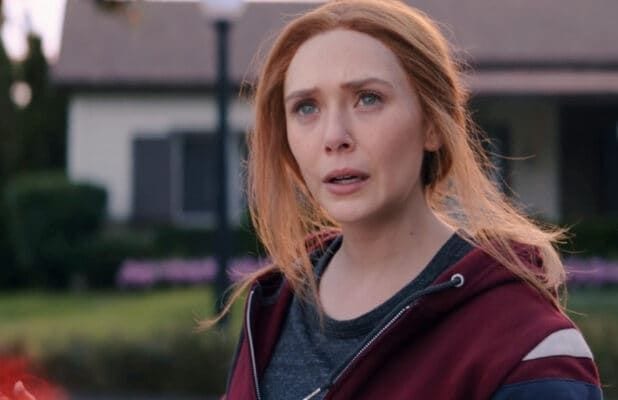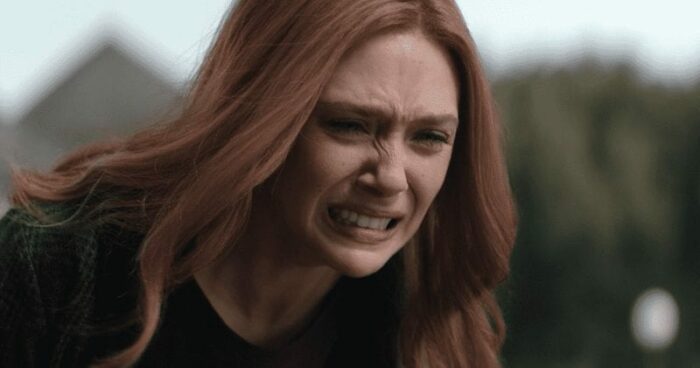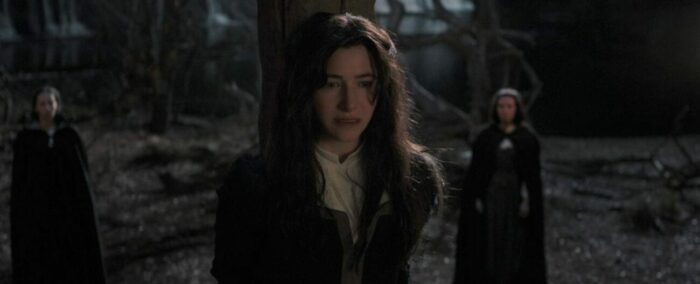For a television show constructed on narrative tropes, ‘Previously On’ puts an exclamation mark on the point WandaVision has been making since the beginning: it knows there is an audience tuning in.
From the beginning of the series, as we found Wanda Maximoff (Elizabeth Olsen) & the Vision (Paul Bettany) existing within the confines of a 1950s cosy American sitcom, Marvel have worked to play with our perceptions and conceptions of the sitcom genre, but ‘Previously On’ actively transforms them from meta-fictional constructs into a literal, in-world storytelling device. WandaVision tethers our understanding of what the series is referencing into the character backstory and emotional development of Wanda, in having her childhood self enamoured of The Dick Van Dyke Show, Bewitched etc…as a means of explaining why the series made the choices it has. Specifically, it connects the show to ‘It May Look Like a Walnut’ from Season 2 of The Dick Van Dyke Show, on which the first episode of WandaVision was heavily based.
On one level, this could be seen as a disappointment. WandaVision traded on being a quirky approach to storytelling in the MCU; perhaps not as edgy, in reality, as some commentators might have suggested, with even Marvel Studios’ surreality coached in a slick, big-budget, distinctly ‘Marvel’ aesthetic, but WandaVision at least seemed to be using an abstract construct to tackle the core of what the series has plainly been about since the project was first announced: Wanda’s grief over Vision’s death, and paradoxically in broad strokes her unresolved grief around her brother and parents. By making these aspects explicit as the show ramps up to the finale, WandaVision loses that abstraction. It makes the strangeness prosaic.
On another level, WandaVision comes into its own in ‘Previously On’. It gathers almost every string dangling across the last seven episodes and pulls out, a la Agatha Harkness (Kathryn Hahn) producing a chubby bunny from nowhere, awareness and context.

Jac Schaeffer and her writing team have an understanding of how narrative devices work, hence the decision to name every episode of WandaVision after specific television tropes. This episode specifically references in its title the ‘previously’, an American staple for decades designed to catch audiences up on what they missed in previous episodes, allowing them the basic plot context and understanding to watch the latest outing. A holdover from the network era, whereby television was produced with one eye on audiences being able to tune in and watch a show at any point, the ‘previously’ is now a quirk employed by some series and rejected by others. Marvel are even evolving the idea with Legends, a compilation on Disney+ of clips from the MCU history of characters featuring in forthcoming shows, allowing audiences to catch up before starting the next MCU project.
In the context of this episode, ‘Previously On’ takes a traditional television narrative construct and places it in the scope of Wanda’s emotional journey. It works to catch the audience up on missing information, both from the backstory of Wanda’s past and WandaVision itself. In having Agatha manipulate Wanda through magic into visiting key memories from her own past, audiences are given a window into Wanda’s psychology as well as providing important pieces to the mystery that has propelled the series to date. Previously segments are clips from episodes or even movies produced before the latest story, and while ‘Previously On’ itself has a previously (just to add an extra meta-textual level to proceedings), Laura Donney’s script is designed to allow the audience a level of understanding that places everything we have seen to date in context. Ironically though, Wanda and Vision’s one scene, set in the Avengers’ compound in the wake of Age of Ultron, could easily have been a deleted scene from Captain America: Civil War, or even Age of Ultron’s denouement.
Indeed, as a sidenote, Wanda’s own personal awareness of TV tropes becomes apparent in this scene as, while watching Malcolm in the Middle, Vision wonders if Bryan Cranston’s father will be okay after a construction he built collapses on him for comic effect. Wanda replies to his concern about whether he would be hurt by suggesting “it’s not that kind of show”. Wanda understands the conventions of comedy, of sitcom, as safe and comforting. These are worlds that despite challenges, or conflicts, or even illnesses, the families within them always turn out to be okay. Parents aren’t blown up by Stark Industries ordinance. Husbands aren’t suddenly murdered and cast aside by universe-bothering tyrants. Rob Petrie might trip over the furniture but he’ll never fall on his head and bleed out. Wanda builds the fantasy of Westview around her literary understanding of sitcom formulas and tropes, which is why as an audience ourselves we have found it so strange and entertaining to see these constructs quarrel with comic book devices and interjections.

The narrative technique of witnessing scenes from a character’s past to inform the present was of course popularised historically in the form of the flashback, chiefly via the TV phenomenon that was Lost, a show that WandaVision—from a structural position—owes a clear debt to. As well as being a serialised show, they both worked to wrong foot audiences, placing them in the position of not having all of the puzzle pieces to construct the whole until the emotional context had been provided. While being a skilled way of building audience anticipation and debate week on week, it also works from a storytelling position to pay off character beats. In this case, Wanda comes to understand what the power within her had forcibly repressed—the dismantling of Vision, both figuratively and literally, and how the explosion of her emotional grief transmutes into a fantasy construction of not just Vision himself but a contorted, historically romantic version of the life they were robbed of together by Thanos.
Nevertheless, ‘Previously On’ does not simply employ flashback. Wanda actively observes her own past, in a twisted Dickensian fashion as Agatha manipulates her damaged emotions for her own ends, and weaves context and exposition, and backstory, into Wanda’s emotional personal revelations. When we see Agatha in the audience of the 1950s set, clapping as Wanda realises her own truth, she serves as a surrogate for what in earlier television shows would have been a simpler device. Lost would craft and tether flashback stories, at their best, to a thematic emotional beat for its characters, and sometimes got away with providing backstory and context at the same time, and WandaVision pulls that trick here. Wanda’s revelation is a powerful moment for invested audiences, with her first moment connecting with Vision, and indeed her childhood self falling for the quaint joy of cosy Americana, both quite moving. It compounds the tragic arc Wanda’s character appears to be on as we head to the unconventional conclusion.
In that sense, Agatha is less of a character in her own right and more of a narrative means to an end. Though a glimpse of her own backstory as part of the coven of witches the Salem witch trials in 1693 Massachusetts worked to uncover (the furthest historically the MCU has ever gone?) provides us with a level of depth for Agatha, a witch who appears to have been transformed into the chaotic darkness her coven feared by their own terror, she nonetheless is designed primarily to invoke the dark side of Wanda, the ‘Scarlet Witch’ who has never been directly referenced as such in the MCU until Agatha’s dramatic declaration of the name by the end.

This might seem anti-climatic to anyone well versed in Marvel or the MCU, but it makes the point to the literate audience that has been obscured up to this point: WandaVision might ostensibly have appeared to be Vision’s epilogue, but it also works as Scarlet Witch’s origin story. Or a point Wanda will be provided with a choice—come to terms with her long-standing grief, abandon the fantasy world she has devised to cope, or become Agatha. Will she be Luke or Anakin Skywalker when faced with the Emperor? To borrow from another Disney property.
We will find out in the finale but in terms of itself, ‘Previously On’ is a smart means of both resolving mystery, constructing payoff and contextualising character. When thrown together with a fusion of metatext and fiction, not to mention Marvel’s traditional awareness of broader historical and popular culture, it could end up serving as one of the series’ finest hours.


This show is one of my favorite things the MCU has ever done. Those first few episodes were as close to “David Lynch” as Marvel will likely ever get, and it was sublime.